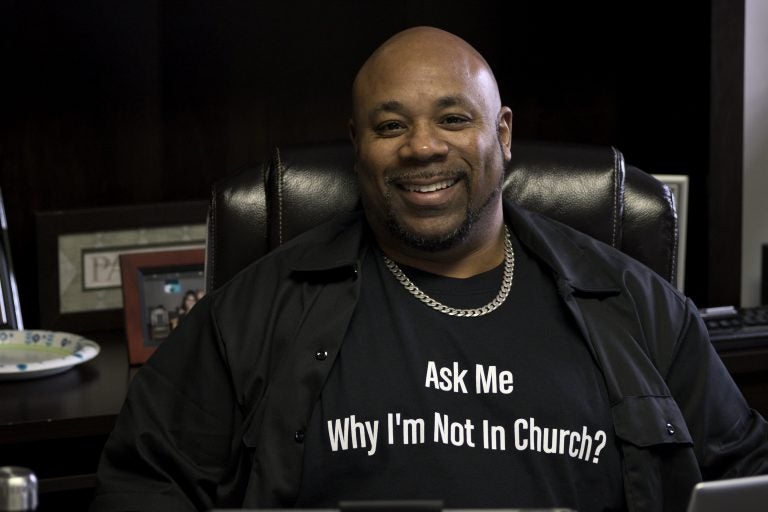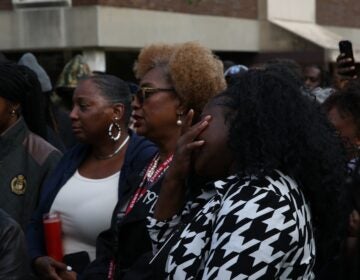Juggling by faith: Montco seminary wants to help pastors balance work and family
Missio Seminary in Montgomery County is launching a new program to help pastors manage the stress that can lead to burnout.
Listen 4:09
Pastor Rev. Larry L. Anderson, Jr. in his office at the Great Commission Church in Northwest Philadelphia on Jan. 29. (Bastiaan Slabbers for WHYY)
Church pastors have busy lives, and preaching on Sundays is just one part of the job.
Pastors counsel families going through tough times, represent their neighborhoods at public meetings, all while running their churches. And for many, that’s in addition to spending time with their families and working a full-time job.
Take, for example, part of Rev. Larry Anderson’s itinerary on a recent Wednesday afternoon. Anderson has been pastor of the Great Commission Church in the West Oak Lane section of Philadelphia for 15 years.
His day began at 5:30 a.m. He prayed, exercised, took his daughter to the bus stop, warmed up his wife’s car, and spent time with his 19-year-old son. All of this happened before he headed to Wawa for coffee.
“I have returning citizens that I mentor and so that’s a part of my day,” he said. “We have a meeting, we’re starting a grief counseling ministry. It’s called ‘Gone Too Soon.’ We had some people in this community that committed suicide; I’m ministering to their parents. We had some that were killed violently.”
Anderson also works a different job to pay the bills. He is director of church health for the Baptist Resource Network, which is part of the Southern Baptist Convention.
Prior to that, he was a professor and director of the urban program at Missio Seminary in Hatfield, Montgomery County. He still maintains ties to the school as a steering committee member of a new program called PULPIT: Program for Urban Leaders and Pastors in Transition.
The school, formerly called Biblical Theological Seminary, received a nearly $1 million grant from the Lily Endowment’s Thriving in Ministry initiative to launch PULPIT.
Frank James, president of the school since 2013, says pastors in urban settings are often on the front line of complex problems.
“People trust their pastors,” James said. “As a consequence, they involve the pastor in issues of trauma, issues of social justice, issues of jobs, so it’s a much more dynamic conception of what it means to be a pastor.”
James credits Taunya Tinsley, Ph.D. director of Missio’s counseling program, for many of the program’s ideas. They’re based on the NFL’s rookie transition program, which she helped to develop.
For pastors, taking on those burdens, along with managing their own affairs, can cause a lot of stress, which can lead to burnout.
Kyuboem Lee, director of Missio’s Doctor of Ministry program, is helping to launch PULPIT. He says people put a lot of expectations on religious and spiritual leaders.
“Often times, they often have to fulfill a certain role in community and society,” he said. “But I think we forget that they’re human beings.”
Anderson agrees. He says many people in the church put the pastor on a pedestal, and that could lead to isolation, even depression.
“That depression manifests itself in a whole lot of deviant ways,” Anderson said, “whether it’s alcohol abuse or womanizing or pornography or whatever the case may be.”
Lee says those in the program will be put in small groups to create a sense of community. Whether they are rookies or veterans, pastors will learn and share information on how to approach urban ministry while still taking care of themselves.
“Often times, clergy don’t have the techniques. They don’t know how to go about doing things in terms of managing their own stress,” Lee added. “Managing their relationships and money, making decisions that are in an ethical way. We’re also going to deal with abuse and addiction.”
Missio hopes to launch PULPIT this spring. It comes as the school is making a transition of its own, moving from the suburbs to Center City Philadelphia sometime this summer.
PULPIT will be its first big mission in its new home.
WHYY is your source for fact-based, in-depth journalism and information. As a nonprofit organization, we rely on financial support from readers like you. Please give today.





